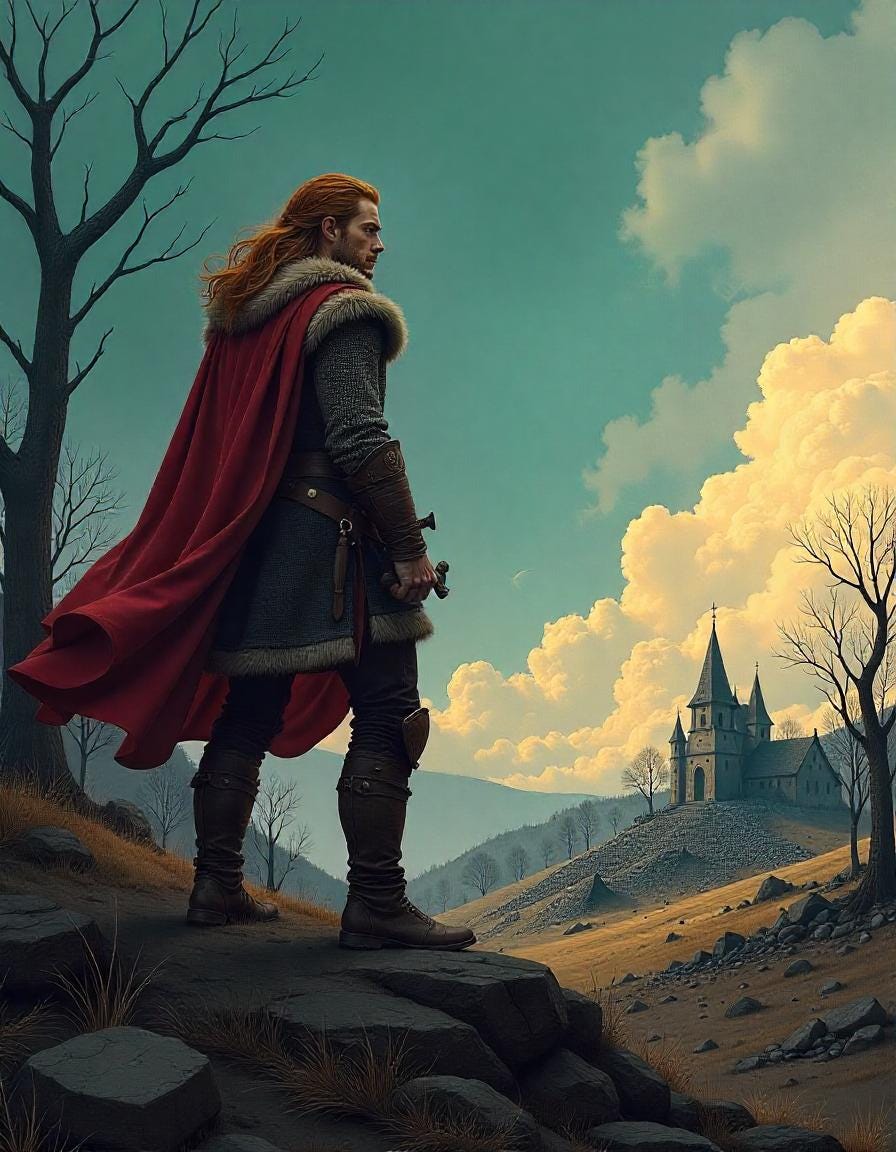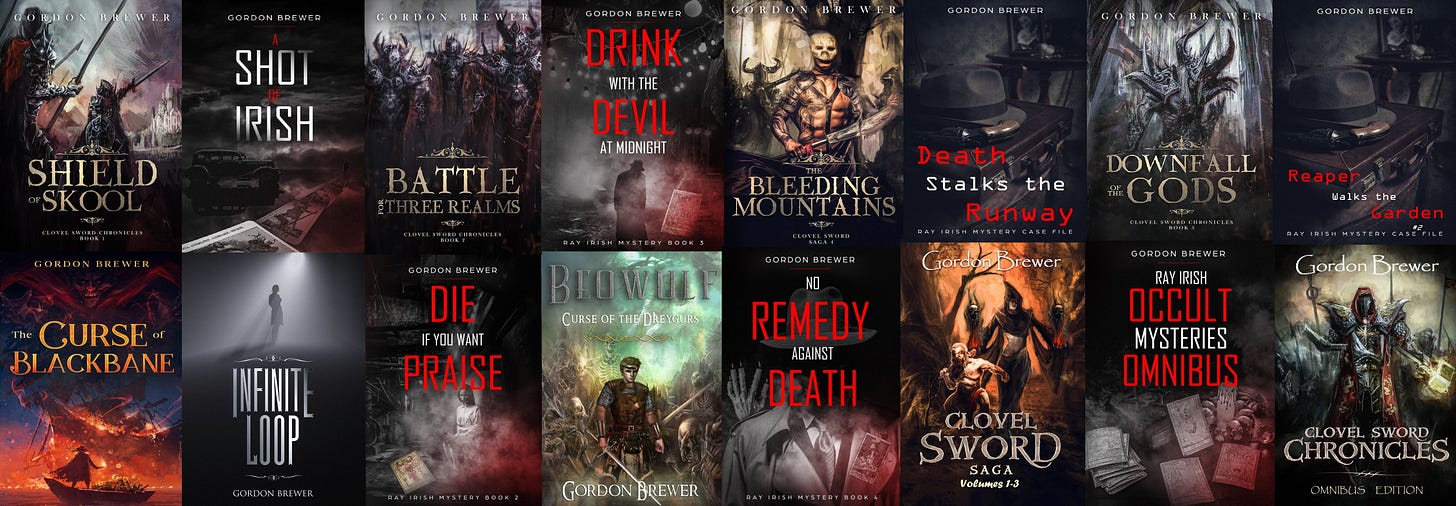This is the webnovel version of my printed novel. The first 10 chapters are available to everyone. If you are a paid subscriber, you can read each chapter as released to the ending. Paid subscribers also have access to the ebook version download as well. For those interested in purchasing the complete book, you can find it here!
All Substack work Copyright 2024 Brewer Internet Publishing LLC
Chapter 2 Someone’s Late
The village stood on the northern outskirts of the Bernician kingdom; many days’ ride from Ida’s home in Bamburgh. Everyone around the North Sea knew King Ida held only a tenuous grip on the borderlands of his kingdom. So, a meeting between Ida and Beowulf would make more sense if they met at the Bamburgh fortress. It also bothered Beowulf that he had little idea of the danger which might lie before them. When he received word concerning the trouble in the northern kingdom held by the Angles, Beowulf jumped at the chance for adventure. However, now, as he had time to think about it, he realized he should have asked for more details.
“Well, too late to worry about that now,” Beowulf stated, mostly to himself.
He took another long look at the dilapidated remnants of the fort perched on the cliff above. It appeared abandoned. This bothered him as well. Even a lazy king would station lookouts in the fort to carry word of any foreign ship arrivals. And he knew King Ida was a wily and experienced fighter. Known as Flamdwyn, or Flame-bearer, Ida led the Angles, the tribe who drove King Morcant Bulc from Bernician land. No king carrying such mettle would leave this fort unattended along his northern water boundary into his lands.
Do not forget the Brythonian enemies surrounding Ida’s lands!
The young warrior recalled the advice given by his king. Heardred, the ruler of the Geats, cautioned his protégé about the many rivalries within the lands of Rheged and other nearby lands. The tribes of Angles, Saxons, and Jutes, all recent invaders, defeated the natives of this North Sea land. Because of this, Brythonians held deep grudges against King Ida and his people. Such resentment would include allies like the Geats.
“Cursed waiting for a king,” Beowulf told Weohstan. “Something is wrong. I can smell it. The village appears abandoned. We’ve seen no ships on this river since our arrival, not even fishermen going out for their daily catch.”
“Maybe some pestilence came through. I’m glad we didn’t hurry into that village. I fear some dark deeds may be at work.” Weohstan agreed with a nod.
He sniffed the wind.
“Something spooks our horses. You don’t have to be a great monster slayer to recognize there is blood in the air. The wind is whipping around too much to find the source of death, but I’ll wager it comes from the silent village. We should send men to scout the area.”
Their leader nodded as he let the pointed jest against him slide.
“I had hoped my uncle’s delay was temporary. Let’s go investigate.” Beowulf glared at his grinning friend.
The sidelong glance was a cover, since Beowulf took no offense. He knew it amused Weohstan to take an occasional jab. The burly warrior considered their leader as a younger brother. At times, he treated him as such. Geat warriors were a rough group who considered fearlessness and strength the mightiest virtues. Beowulf might resent the treatment from Weohstan as a self-proclaimed mentor. Still, he valued their friendship.
Also, Beowulf understood Weohstan’s jab. When he killed the Piast, a sea monster, the event sent Beowulf’s fame across the kingdom. Despite his thegn’s help in killing the monster when attacked the Geat villages a season before, his men received little recognition. While envy came to everyone, Beowulf knew his stocky friend held no ill towards his growing recognition.
Loyalty, devotion, and kinship were the code lived by the warriors. The men who followed Beowulf received little attention despite their vital role. The scobs, minstrels who sang the marvelous stories of heroes around the lodge fires, seldom gave their attention to thegns. Only an outstanding act of heroism elevated a warrior above others, especially over those nobles of a higher class. Beowulf knew he could depend on upon the fierce allegiance of his men to follow him and whatever causes he might choose for them. It was the way of the Geat warriors and the way of those who came with him.
“Well, enough of the waiting. It is our good fortune to have a fine sunny day. Come, we will go find my uncle and his warriors. They must have lost their way.” Beowulf joked loudly as he placed his leather boot into the stirrup of his high-backed saddle.
As he swung himself onto the magnificent horse, his action immediately sent his men to their tall mounts. The horses stood several hands taller than the native horses around the North Sea. As intended by King Hrethel, the imported mounts were a symbol of their Geat power. Riding the enormous horses gave Beowulf and his men the appearance of overwhelming warriors when they charged. When combined with the leather armor covering the mounts, the mounted warrior and horse were an impressive display. They fulfilled their intended role of helping dominate rival tribes and clans around the kingdom.
Patting his horse’s neck while his men assembled, Beowulf fondly remembered the day he received the animal. The king, a great warrior who fostered Beowulf for many years, brought the mounts into Geatland from areas farther south. The Geat king recognized the value of such powerful horses, and he insisted Beowulf display this when he came to Bernicia.
Finally, Beowulf put on his helmet of sheet iron, which had long cheek-plates running down on both sides of his face. A long, thin nose-guard covered the front area of the helmet while a chain-mail curtain covered his neck, providing extra protection. Characteristic of his tribe’s helmets, the top of the helmet crest carried the sculpted figure of a boar. During combat, it invoked the god Freyr for protection.
While he held a short stature, Beowulf appeared a feared warrior atop his horse. His broad shoulders and muscular arms came from years of training using many bronze and iron weapons. This bulk allowed him to fill the leather and chain armor around his body easily. Properly outfitted for his enemies, Beowulf dug his heels into his horse.
As their leader passed them, his men lined up behind him. Their mounts added the noise of hoofs amid the clattering echoes filling the still air as he led them from the wooden dock onto the old cobblestone road. They followed a well-worn trail from many years of traffic at this ancient stopping point. Empty carts lined the area closest to the path, showing the village was a trade center for the nearby area.
The group’s short ride quickly stopped. An abandoned two-wheel cart sat in the middle of the road, still filled with goods. Suspicious, two of the men drew close to inspect the wagon, sliding off their mounts. As the fighters pulled it out of the way, Osberht noticed the yoke leather ripped from the cart. Picking up the blood-stained leather harness which hooked the animal to the wagon, he held it up for the others to see. Weohstan pointed out the large dark stains of dried blood on the ground around the front of the wagon.
“Wolves?” Weohstan guessed.
Beowulf said nothing in response. Then he ordered two of his men to move into positions along either side of the road to look for other signs. Then he led the rest of his men to their destination.
Rounding a bend in the road just outside the village, they discovered the remains of a small shop. Smoldering ruins sat nestled in a sparse semicircle grove of trees. The scorched, blackened walls still stood, while occasional whiffs of white smoke rose, only to be blown away by the gusting wind. Beowulf sent Sigibert into the rubble. He watched with some amusement when the young man jumped down from his mount, nearly tripping from excitement at his task.
Sigibert quickly covered the area, stopping near the corner of a standing wall. He bent down and pulled on a charred piece of wool cloth. The sight he revealed caused the man to take a breath, and he gave the sign of the cross. Then he mumbled a prayer under his breath. Osberht immediately jumped down from his brown horse, running to see the cause of Sigibert’s reaction; all the while, the warrior was mocking the God’s thegn. Osberht stopped in his tracks when he saw the body in the rubble.
“Well, what did you find?” yelled Beowulf impatiently.
“It was a young child, I think,” Osberht replied while Sigibert kneeled at the remains. His Latin prayer came in a language which none of the others understood.
“What do you mean? Is it a child or not?” Beowulf asked again, and Sigibert looked up.
“It is hard to say. It might be a small woman. Something ripped apart and ate much of the body. Just a few pieces remain along with the clothing.” He declared as Osberht nodded in agreement.
Both men viewed death and butchery before. Still, neither expected half-eaten remains inside the burned-out building. Sigibert stood and stepped his way carefully through the debris, returning to his horse. Osberht looked around for a moment and followed the monk out of the rubble.
“Well, some scavengers must have been scrounging around, a wolf pack perhaps,” suggested Weohstan. “They might have gotten the oxen as well.”
Aeschere, sitting on his gray mare, overheard the words and shook his head.
“I’ve never heard of a wolf pack destroying a home. No animals go into a house to burn it down. Besides, where are the bodies of the oxen? Wolves can’t carry off something that large.”
“An accidental fire when the wolves were scrounging around,” replied Beowulf impatiently.
He scowled as he considered the surrounding mystery.
“We can sit here and speculate till the winds of Thunor come, or we can find out from the Angle leader of this land. Whatever caused this is probably part of the reason my uncle has failed to meet us here. No doubt he is hunting down the culprits as we speak.”
Beowulf gave a perplexed look at Sigibert when the monk asked if he could bury the remains of the child.
“The child was not worthy of such a ritual,” the Geat leader reminded the monk.
“Perhaps, but it’s better than the corpse becoming food for predators,” Sigibert mumbled.
Beowulf glanced at his men, who looked as confused as well. The child could never reach hebanwang, their paradise. Burial of the noble dead was a grand endeavor. A body burned and buried with grave goods along with a dirge sang. The king’s burial required a ship’s sacrifice, then the remains covered with high mounds as gateways to the gods. Those were rituals for the worthy warriors. Burial of a lost child meant nothing to the Geats.
Osberht, who was rolling his eyes at the suggestion, muttered that Sigibert wasted their time. Beowulf frowned.
“Very well, monk. You have your burial.” The Geat leader said. “Osberht, you will stay with the monk. You need to keep a sharp eye out for danger, since we’re not sure what happened here.”
Osberht directed his glare at Sigibert before the warrior reluctantly nodded his head. The two men were often at loggerheads. Beowulf grew tired of the petty battles, so he decided Osberht work with the monk.
Beowulf dug his heels into the black mare’s flanks. As he galloped away, the other thanes taunted Osberht briefly before they raced to catch up.
Like this and other stories? Consider becoming a paid subscriber.
Discover all my books at the link below.





